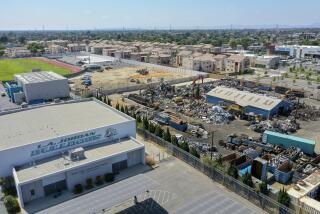Mobil Oil, 10 Contractors Cited for Safety Rule Violations
Federal officials cited Mobil Oil and nine of its contractors Monday, accusing them of 100 violations of safety regulations at the oil company’s troubled Torrance refinery, including 53 “serious” violations.
But Mobil characterized many of the alleged violations as involving “housekeeping” and said it would contest many of the citations.
The federal Occupational Safety and Health Administration is seeking $30,040 in fines from Mobil and the contractors. A 10th contractor has also been cited, but details of the alleged violations were withheld pending notification of the company.
OSHA defines “serious” violations as those “where there is a substantial probability that death or serious physical harm could result, and where the employer knew, or could have known, of the hazard.”
Of the serious violations, 18 were attributed to Mobil itself, ranging from unsafe ladders that allegedly expose workers to dangerous falls to the lack of an adequate fire alarm system that could result in workers being trapped in the event of a fire.
‘Fire, Explosion Hazards’
The company was also cited for using steel that might give way at high temperatures and for using undersized relief valves that might blow in an emergency, “exposing employees to fire and explosion hazards.”
There is a 15-day deadline for the firms to decide whether to appeal, as Mobil has in a case stemming from an explosion and the release of 100 pounds of highly toxic hydrofluoric acid last November. OSHA officials said that explosion was caused by the use of relief valves too small to handle emergency pressures, while Mobil asserts that faulty instrumentation was the cause of the explosion. The dispute remains pending before an administrative law judge.
The inspection producing the current crop of citations began Sept. 13 and was triggered by two unrelated incidents July 15--an explosion and a fire that killed a worker and seriously injured four others. The double disaster came after an 18-month series of problems at the refinery, including two other deaths, explosions, fires, toxic releases and air pollution incidents.
Cal Cat Chem, a contractor based in Benecia whose employee was killed in the July 15 explosion, received five serious citations, including one alleging that its employees failed to recognize that their procedures could create an explosive, gaseous mixture.
Another citation against the firm stated that it used a pump and a 100-foot extension cord that were not approved for areas where flammable gases might be found, “exposing employees to the hazards or fire and/or explosion.” Cal Cat Chem employee Winston Alexander Jones of Harbor City died in the blast.
Mobil spokesman Jim Carbonetti on Monday downplayed the allegations against the oil company as “not of a nature which would indicate significant . . . deficiencies at our refinery. Many of them could be characterized as ‘housekeeping’ type items.”
Many of these citations, he said, are based on OSHA’s interpretations of regulatory codes “which differ from Mobil’s understandings. I therefore expect that Mobil will contest many of the alleged violations.”
Frank Strasheim, regional OSHA administrator, said OSHA investigators had found “a significant number of violations” but he praised the cooperation of Mobil and its unions.
“I feel confident that the refinery now is a much safer workplace for the firm’s 800 employees because of this cooperation and the hazards which are being eliminated as a result of our inspection,” Strasheim said.
The inspection did not find any current condition “likely to cause a catastrophic event,” he said, in an apparent reference to the possibility of a major release of highly toxic hydrofluoric acid, which is used to upgrade the octane of unleaded gasoline.
The federal safety inspection was one of several ongoing examinations of conditions at Mobil.
The city of Torrance is conducting its own assessment of safety at the refinery, through an $88,000 study that Mobil is paying for. The Torrance Fire Department has also ordered Mobil to prepare a risk management and prevention program, which is expected in March.
In the aftermath of the November explosion and release, the South Coast Air Quality Management District also created a special task force.
The task force, which is considering whether to eliminate the use of hydrofluoric acid at Mobil and three other refineries, is about halfway through its work and expects to make recommendations next year.
More to Read
Inside the business of entertainment
The Wide Shot brings you news, analysis and insights on everything from streaming wars to production — and what it all means for the future.
You may occasionally receive promotional content from the Los Angeles Times.










